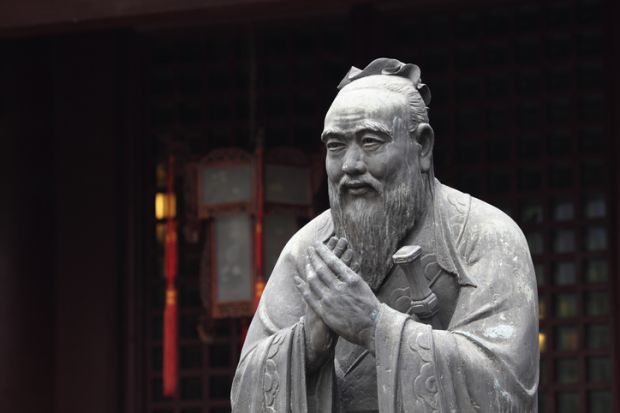Neither Covid-19 nor the escalation of political tensions with the West has diminished China’s thirst for Western education. While Australia’s restrictive border policies have seen Chinese enrolments drop, Chinese students are still coming to the UK for higher education, their numbers doubling since 2017.
However, Western universities should be wary of assuming that this thirst can be endlessly milked. While the travels of these sea turtles, as they are sometimes known back home, are still seen as necessary to China’s development, this may not always be the case. In those circumstances, unless their expectations are better monitored and met, they may choose to stay home, with serious consequences for Western universities’ bottom lines – not to mention their global influence.
Many of these sea turtles are arriving in the UK with a stronger shell of language competency. However, a large number still arrive with cracks in their fluency. Considerable numbers embark on pre-sessional courses. But although there are immense benefits to such preparation, they need to expand beyond their current effective remit as giant remedial programmes aimed at helping as many students as possible attain the required language test score to secure automatic degree entrance.
My workplace, for example, incorporates discipline-specific themes into the students’ language assessments. This, though, is not enough on its own, either. Such tailored teaching and assessment need to be spread out into students’ actual degree programmes.
This is all part of acclimatising Chinese students to their new academic environment. Sending them onto a UK degree programme with only a reasonable IELTS score is like asking someone to swim the English channel with just a high school swimming certificate.
For most Chinese students, achieving cultural and academic literacy in their new environment is as great a challenge as achieving language fluency. But without that literacy, it is very difficult for them to navigate a Western degree course, many of whose conventions are very different to the Chinese context. Faced with such a sink-or-swim situation, many sea turtles understandably flounder.
Before the pandemic, many of us in education, almost unknowingly, had ideas that were embedded in a conservative mindset. Now, we appear to be entering a world where there is more talk of compassion, social justice, co-creation and decolonisation of the curriculum. Many of these ideas, though, appear to be primarily applicable to the context of home students.
How many universities have honestly conceptualised international students being part of BAME communities? How much consideration has been given to the impact of colonialism on today’s Chinese psyche? If assessment is to be decolonised for Black British students, why aren’t the same principles being applied to Chinese students, creating scope within the criteria for students to gain marks for adaptation or application of their learning styles to the Western context.
As tides of change sweep through higher education, Chinese students can no longer be treated as a homogenous block. As an educator of English teachers and a manager of courses, I despair at colleagues who describe their group as “Abdul from Bahrain, Marco from Italy, Celine from France, Vee from Thailand and seven Chinese”. I can only imagine the variations on this mindset found in other university departments.
Moreover, as we increasingly co-create content with students, validating and valuing their perspectives, we need to do the same with regard to alternative learning styles. And while some educators may see this as too great a contradiction, there are ways of working with Chinese students that meet in the middle.
Western-style critical thinking is about taking knowledge and applying our individual interpretation of it. East Asian learners generally look at the world from more of a Confucian perspective, seeking binary answers rather than shades of grey. The Confucian approach, moreover, is more communal. It looks at a body of knowledge or a historical precedent and considers how that might be applied to the new situation. In other words, Confucian thinkers look to apply learning, rather than analyse it.
That can lead them to see Western-style criticality as just a technique for passing exams. That could partly be overcome by applying it to specifically Chinese contexts. One example might be Chinese transportation advances, where China appears to have looked at what Japan was doing with its bullet trains and created its own maglev versions. My experience is that such efforts to make assignments more relevant to them are greatly appreciated by the students.
Of course, the Chinese government is hostile to the application of critical thinking to certain topics, but there are ways to approach this. I have seen lessons and discussions around LGBT issues, for example, that have then provided a stimulus for Chinese students to ask questions around other taboo topics, such as Hong Kong, Tibet and media censorship.
Such topics are particularly sensitive given the growing tensions between China and the West, of course. But creating pedagogies that allow Western universities to work in sync with Chinese students might even stimulate a new politics of mutual benefit. This could create a situation where the Chinese government sees an opening up of mindsets that is beneficial rather than threatening: a shift away from absolutist thinking.
It is certainly a more promising route to better mutual relations than sending warships to the East China Sea.
Paul Breen is a senior lecturer in the University of Westminster’s Centre for Education, Teaching and Innovation. He is the author of several works relating to international education and teacher education.
Register to continue
Why register?
- Registration is free and only takes a moment
- Once registered, you can read 3 articles a month
- Sign up for our newsletter
Subscribe
Or subscribe for unlimited access to:
- Unlimited access to news, views, insights & reviews
- Digital editions
- Digital access to THE’s university and college rankings analysis
Already registered or a current subscriber? Login








